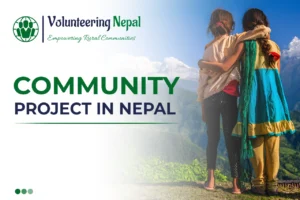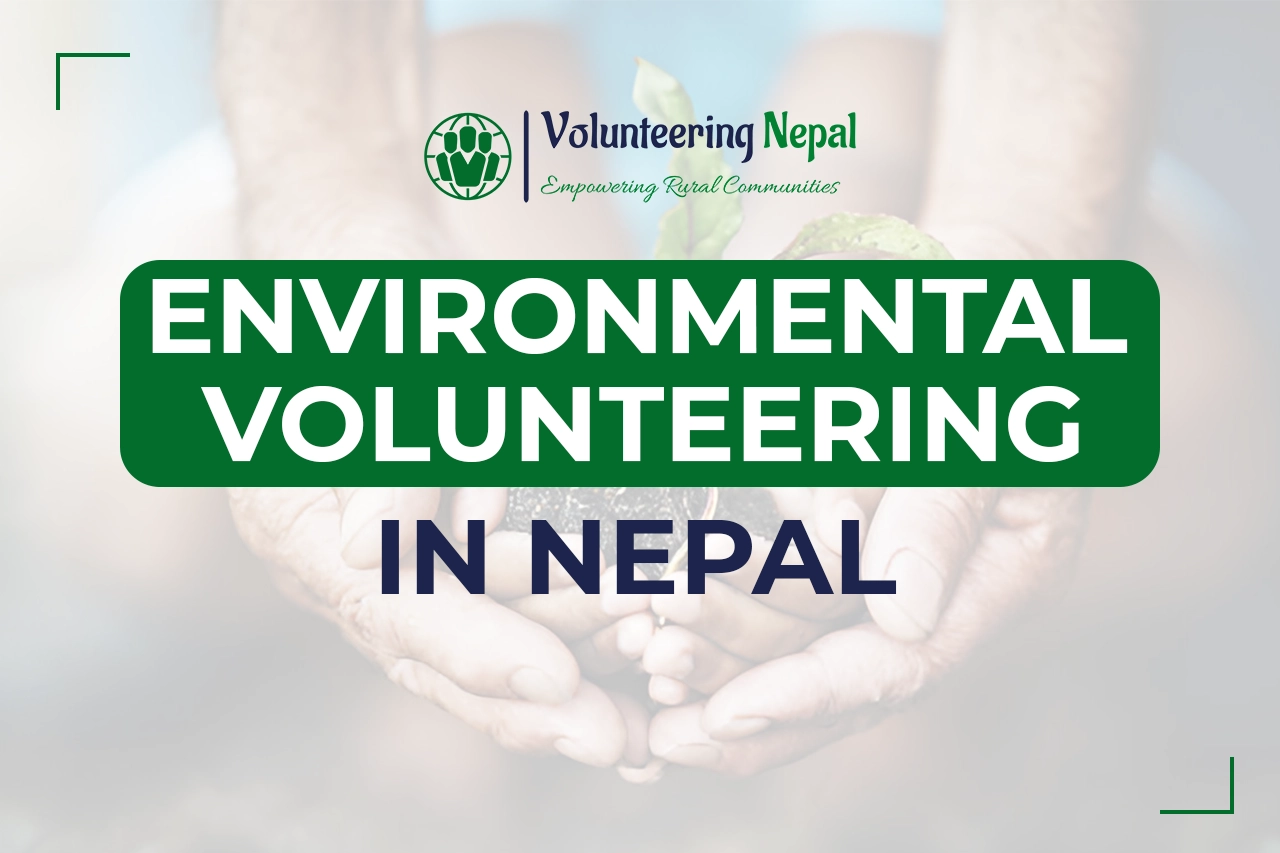
More Than Mountains: A Guide to Environmental Volunteering in Nepal
Nepal is home to some of the most incredible, soul-stirring beauty in the world. From the towering peaks of Everest to the lush green hills and vibrant communities, this country is truly unique. However, this natural paradise is fragile. Our sacred rivers and forests need help from people who have the volunteer motivations to clean up for the proper connection to nature. That’s why environmental volunteering has become an essential way to engage with and protect this land.
This isn’t just about a vacation; it’s about connection to nature, contribution, and becoming part of a solution. It’s about leaving Nepal a little better than you found it. Nepal environmental volunteer work consists of outdoor recreation such as tree planting activities, composting organic waste, and plant nursery.
If you’ve ever felt a pull to do something meaningful and create environmental justice for nature while you travel, this guide is for you.
Why Choose Nepal for Environmental Volunteering?
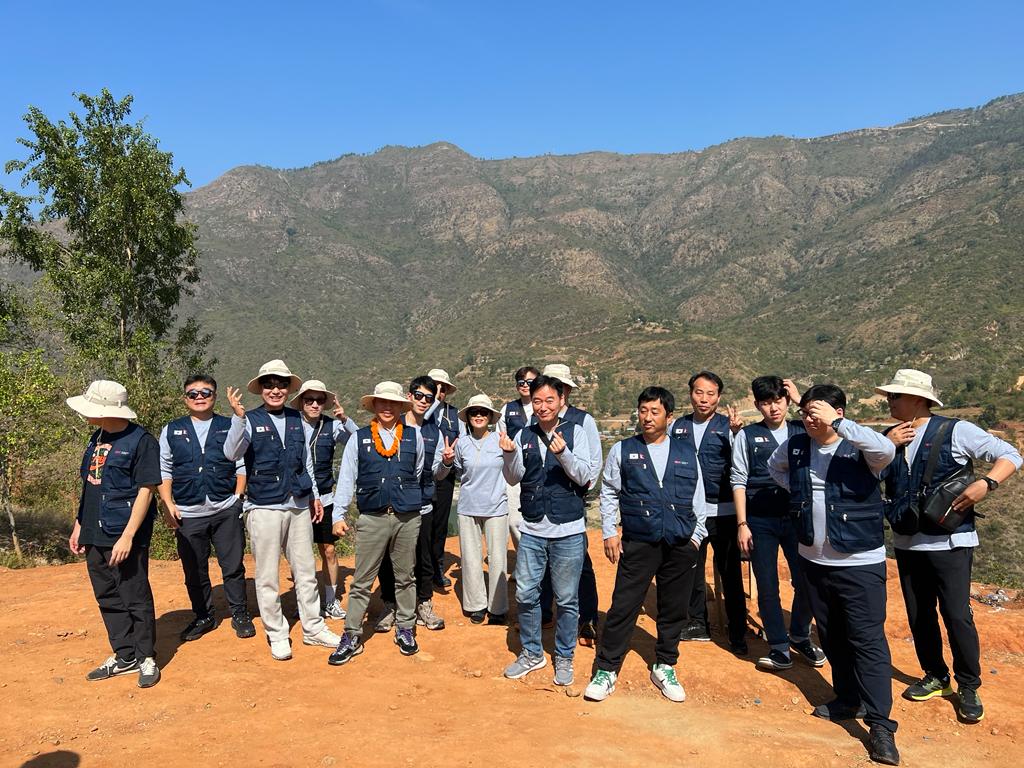
Choosing to volunteer abroad is a significant decision and also requires social connections. So why Nepal? The answer goes beyond the stunning landscapes and volunteer motivations. It’s about stepping into a place where your help is genuinely needed and deeply appreciated.
Here, your efforts are not just a drop in the ocean; they create ripples of positive environmental impact that can be seen and felt. You’re not just a tourist; you become a partner in a journey towards a sustainable future with proper environmental values. Many environmental groups are directly associated with some non-profit organizations, like Volunteering Nepal with proper volunteering outdoors, performing different programs containing their ecological volunteer work.
Nepal, a land of mountains, is rich in biodiversity, offering a range of environmental volunteer opportunities within its diverse ecosystems and natural habitats.
A Land of Breathtaking Biodiversity with complex natural ecosystems
Nepal is a biodiversity hotspot, home to an astonishing range of ecosystems. In the southern plains of Chitwan National Park, you can find the majestic one-horned rhinoceros and the elusive Bengal tiger. As you move up into the hills, the endangered red panda makes its home.
This natural richness is our pride, but it’s also under threat from habitat loss and climate change. By performing environmental volunteering, you get to work on the front lines, helping to protect these creatures and their habitats.
Also, with the proper community outreach we can voluntarily stop the species extinction, which can be a prior factor for the community betterment.
The Impact of Environmental Volunteering on Community Conservation
Engaging in environmental volunteering offers an opportunity not only to help preserve the natural world but also to connect with local communities who depend on the land for their livelihoods. Many volunteers join projects focused on sustainable agriculture, habitat restoration, or waste management, contributing to environmental protection and supporting conservation initiatives in key regions like National Parks or protected ecosystems. Through these projects, volunteers help address urgent issues like carbon emissions, climate change, and the depletion of natural resources.
Moreover, volunteering in environmental programs fosters a sense of environmental citizenship, where individuals recognize their role in tackling global challenges. Community engagement is central to these efforts, as volunteers work directly with local residents, helping them adopt practices that are more sustainable and beneficial for the environment. Whether it’s educating about renewable energy or assisting in native plant restoration, each contribution helps create a more sustainable and eco-conscious future.
By joining hands with local communities and participating in citizen science, volunteers help gather essential data that informs and shapes future efforts in environmental conservation. The collective impact of helping the environment through small, individual actions can create long-lasting change, whether it’s planting trees in National Parks, cleaning up polluted areas, or advocating for sustainable practices.
This work, along with the growing importance of environmental protection, is vital for addressing the escalating challenges of climate change and securing a healthier, more sustainable planet, and some of the urgent needs of the natural ecosystems are provided in the next paragraph.
Environmental Volunteering in Nepal: Make a lasting Impact
Environmental volunteering in Nepal is not only an effort to help the environment, rather it is a profoundly satisfying process. People who volunteer probably get an opportunity to connect with the local communities of the country and learn their traditional methods of conservation and as well get acquainted with the true hospitality of Nepal families. This makes you develop life long connections with not just nature but also the individuals who are dedicated to the protection of the environment. Exploring environmental volunteer opportunities near me or considering an international volunteer experience, there is hardly an activity that can match the experience of environmental volunteer work in Nepal, which is both exciting, has an impact, and has a sense of purpose.
Here are some urgent needs for volunteering for nature in Nepal
The Urgent Need for Climate Volunteer Opportunities
The reality is that our environment is facing serious challenges. The Himalayas, our “water towers,” are seeing glaciers melt at an alarming rate, affecting water supply for millions. Plastic pollution is a growing problem in towns and popular trekking routes.
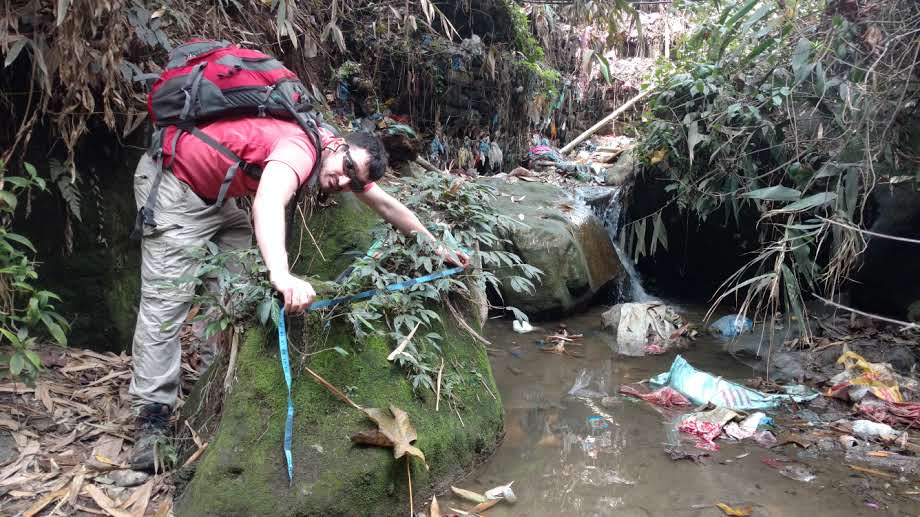
This is where environmental volunteering becomes so powerful. By joining a clean-up drive, a reforestation project, or a sustainable farming initiative, you directly tackle these issues. Your work helps mitigate the effects of climate change and pollution, creating a healthier environment for everyone.
A Chance to Connect with Local Communities through Environmental Volunteering
Volunteering in Nepal is as much about people as it is about nature. Our conservation efforts are deeply intertwined with the local communities who have been stewards of these lands for generations. True environmentalism here means empowering these communities.
When you volunteer, you’ll likely work side-by-side with local people, sharing meals, stories, and laughter. You’ll learn about their culture, traditional knowledge of the forest, and their hopes for the future. This human connection is often the most rewarding part of the entire experience.
What Kind of Environmental Volunteering Can You Do?
The beauty of environmental volunteering in Nepal is the variety of projects available. You don’t need to be a scientist or expert to make a difference. All you need is a willing heart and a desire to help, and there will be a project that fits your passion.
- Reforestation and Tree Planting Projects: Deforestation is a significant issue in the hilly regions of Nepal, leading to soil erosion and an increased risk of landslides. Many local communities have established “community forests” to combat this, and volunteers are a huge help.
- Wildlife Conservation and Research: Projects often involve working with local community conservationists to monitor wildlife populations. This could mean setting up camera traps to track animal movements or conducting surveys of local bird species.
- Waste Management and Community Clean-up Drives: With the rise in tourism and consumer goods, managing waste has become a huge challenge. Many volunteer projects focus on this very issue, including teaching local schoolchildren about recycling.
Finding the Right Environmental Volunteer Program for You
Navigating the world of volunteer programs can feel overwhelming, but don’t worry. The key is to do your research and find an organization that is ethical, responsible, and a good fit for you.
Start by looking for organizations that have a long-standing presence in Nepal and strong relationships with local communities. A reputable program will be completely transparent about where your volunteer fees go.
Questions to Ask Before You Commit:
- What does a typical day/week look like for a volunteer?
- What kind of training and support will I receive on-site?
- How does this project directly involve and benefit the local community?
- Can you provide a clear breakdown of the program fees?
- What safety measures and emergency protocols are in place?
What You’ll Gain
Volunteers report benefits like:
- Increased connection to nature
- Enhanced global perspective and cultural empathy
- Experience with environmental monitoring and civic engagement
- Improved physical activity and reduction in chronic conditions
A Glimpse into the Volunteer Experience
A few years ago, I joined a small project in a village a day’s journey from Pokhara. We were working on building a waste segregation system and planting trees on a barren hillside. The experience taught me more about my own country and the environment than I could have imagined. It was challenging, humbling, and one of the most beautiful experiences of my life.
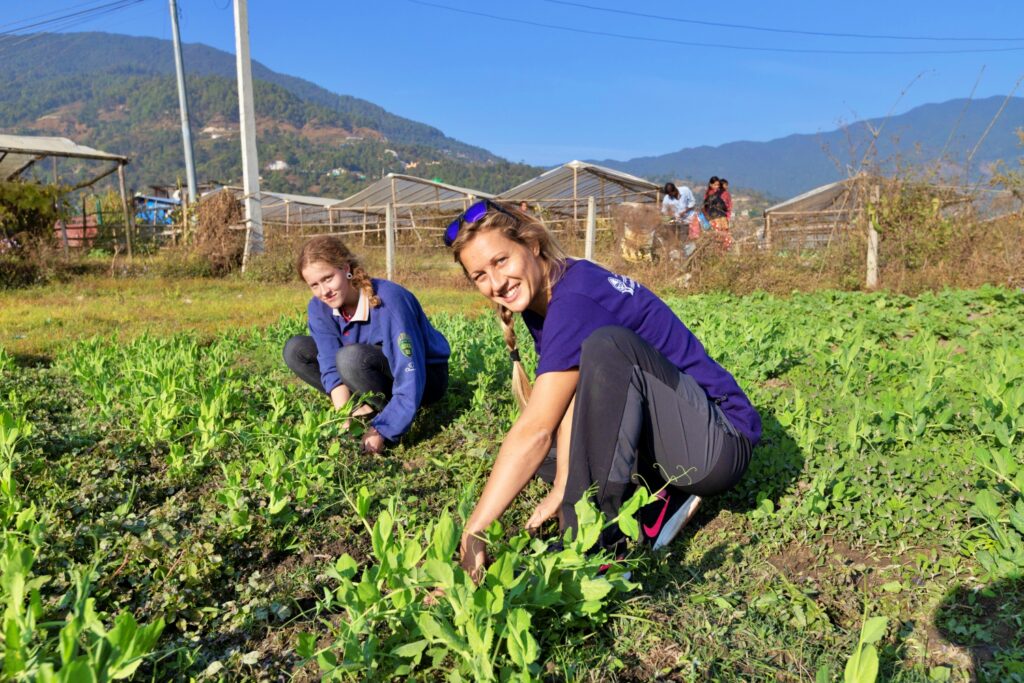
Arriving in a Hill Village
After a bumpy bus ride, I arrived in the village. There were no roads, just stone footpaths. The air was clean, filled with the sounds of children laughing and birds chirping. My host family welcomed me with a warm smile and a cup of sweet milk tea.
I stayed in a simple room in their home, sharing meals of dal bhat (lentils and rice) with them every day. The initial feeling of being a stranger quickly faded as I was welcomed into their daily lives. This immersion was as important as the work itself.
The Daily Work: More Than Just Digging Holes
Our days started early. We’d work for a few hours in the morning, either digging pits for waste or planting saplings on the hill. We worked alongside village elders who shared stories of how the forest used to be, which gave our work a deep sense of purpose.
The afternoons were spent teaching basic English and environmental awareness at the local school. Seeing the children’s faces light up as they learned about recycling was incredible.
The Unexpected Lessons
The biggest lessons came not from the project, but from the people. I learned about the power of community, as everyone worked together for a common goal. I learned patience from my host mother as she taught me how to cook on a traditional stove.
Most of all, I learned humility. Living with fewer material possessions, I realized how little we truly need to be happy.
Practical Tips for Your Environmental Volunteering Journey in Nepal
Being well-prepared is key to having a safe, respectful, and enjoyable volunteer experience. Nepal is a welcoming country, but it has its own customs and challenges. A little bit of preparation goes a long way in helping you adapt smoothly.
Packing Essentials (and What to Leave Behind)
- Essentials to Pack: Sturdy hiking boots, comfortable work clothes, waterproof jacket, reusable water bottle, headlamp.
- Leave Behind: Expensive jewelry, unnecessary electronics, rigid mindset for conservation initiatives, and environmental challenges.
Health, Safety, and Cultural Etiquette
Before you travel, consult your doctor about necessary vaccinations and chronic pain. Always drink filtered, boiled, or purified water. While Nepal is generally safe, be mindful of your belongings in crowded areas.
Culturally, remember to dress modestly, especially in villages and when visiting temples. Use your right hand to give or receive things. A simple, smiling “Namaste” with your palms together is the universal greeting just a simple social factor.
Managing Your Expectations with Environmental Volunteering
It’s important to be realistic. Your accommodation will likely be basic, the food will be simple, and things may not always go according to plan. Embrace these challenges as part of an authentic experience.
Who Can Join Environmental Volunteering?
From high school graduates to retirees, anyone can contribute. Popular profiles include:
- Students looking for academic credit or internships
- US-based professionals seeking green volunteering projects abroad
- Families interested in volunteering outdoors
- Solo travelers, gap year participants, and career changers
Volunteering also improves mental health, lowers blood pressure, and provides a sense of purpose known as the “helper’s high.”
FAQ’s
- What is the meaning of environmental volunteering?
Environmental volunteering is the act of volunteering to help protect and preserve the environment. It includes activities like conservation, clean-ups, and sustainability efforts. - What is volunteering for environmental causes?
Volunteering for environmental causes involves working on projects that aim to protect natural resources. Volunteers support efforts like wildlife conservation, pollution reduction, and ecosystem restoration. - What is the main focus of environmental voluntary?
The main focus is addressing environmental challenges like climate change and pollution. It promotes sustainability through community involvement and eco-friendly practices. - What is an eco volunteer?
An eco volunteer is someone who volunteers for environmental causes, often working on conservation projects or sustainability efforts. They help protect natural habitats and support eco-friendly initiatives. - What are the benefits of environmental volunteering?
Environmental volunteering opportunities helps preserve natural resources, promotes sustainability, and creates positive community impact. It also provides volunteers with the opportunity to learn new skills and connect with like-minded individuals
Your Journey of Impact Awaits
Environmental volunteering in Nepal is more than a trip. It’s a chance to connect with nature, empower communities, and discover a strength within yourself that you never knew you had.
Are you ready to start your own journey? Begin by researching community-led conservation projects that resonate with your heart. The mountains, forests, and people of Nepal are waiting. Apply now


